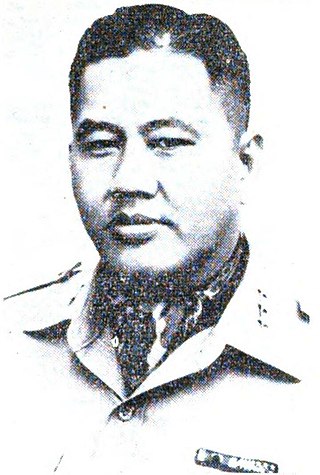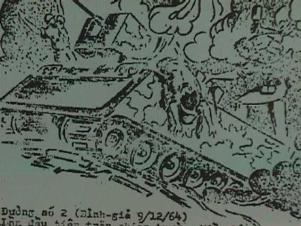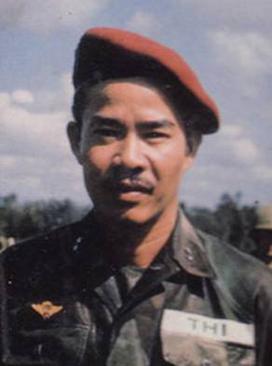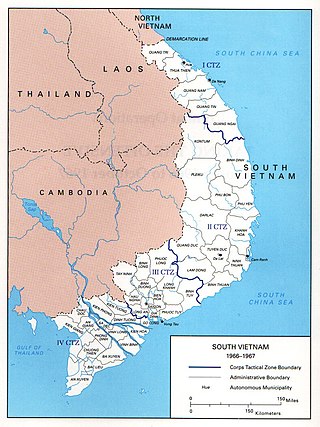
Dương Văn Minh, popularly known as Big Minh, was a South Vietnamese politician and a senior general in the Army of the Republic of Vietnam (ARVN) and a politician during the presidency of Ngô Đình Diệm. In 1963, he became chief of a military junta after leading a coup in which Diệm was assassinated. Minh lasted only three months before being toppled by Nguyễn Khánh, but assumed power again as the fourth and last President of South Vietnam in April 1975, two days before surrendering to North Vietnamese forces. He earned his nickname "Big Minh", because he was approximately 1.83 m (6 ft) tall and weighed 90 kg (198 lb).

Nguyễn Khánh was a South Vietnamese military officer and Army of the Republic of Vietnam general who served in various capacities as head of state and prime minister of South Vietnam while at the head of a military junta from January 1964 until February 1965. He was involved in or against many coup attempts, failed and successful, from 1960 until his defeat and exile from South Vietnam in 1965. Khánh lived out his later years with his family in exile in the United States. He died in 2013 in San Jose, California, at age 85.

Nguyễn Văn Thiệu was a South Vietnamese military officer and politician who was the president of South Vietnam from 1967 to 1975. He was a general in the Republic of Vietnam Armed Forces (RVNAF), became head of a military junta in 1965, and then president after winning an election in 1967. He established rule over South Vietnam until he resigned and left the nation and relocated to Taipei a few days before the fall of Saigon and the ultimate North Vietnamese victory.

The Army of the Republic of Vietnam composed the ground forces of the South Vietnamese military from its inception in 1955 to the Fall of Saigon in April 1975. At the ARVN's peak, an estimated 1 in 9 citizens of South Vietnam were enlisted, composed of Regular Forces and the more voluntary Regional Forces and the Popular Force militias. It is estimated to have suffered 1,394,000 casualties during the Vietnam War.

The Battle of Đồng Xoài was a major battle fought during the Vietnam War as part of the Viet Cong (VC) Summer Offensive of 1965. It took place in Phước Long Province, South Vietnam, between June 9 and 13, 1965.

Trần Thiện Khiêm was a South Vietnamese soldier and politician, who served as a General in the Army of the Republic of Vietnam (ARVN) during the Vietnam War. He was born in Saigon, Cochinchina, French Indochina. During the 1960s, he was involved in several coups. He helped President Ngô Đình Diệm put down a November 1960 coup attempt and was rewarded with a promotion. In 1963, however, he was involved in the coup that deposed and assassinated Diêm.

The Battle of Bình Giã was conducted by the Viet Cong (VC) and People's Army of Vietnam (PAVN) from December 28, 1964, to January 1, 1965, during the Vietnam War in Bình Giã, Phước Tuy province, South Vietnam.

The Battle of Ba Gia was a major battle that marked the beginning of the Viet Cong's (VC) Summer Offensive of 1965, during the early phases of the Vietnam War. The battle took place in Quảng Ngãi Province, South Vietnam, between May 28–31, 1965.

The Brinks Hotel in Saigon, also known as the Brink Bachelor Officers Quarters (BOQ), was bombed by the Viet Cong on the evening of December 24, 1964, during the Vietnam War. Two Viet Cong operatives detonated a car bomb underneath the hotel, which housed United States Army officers. The explosion killed two Americans, an officer and an NCO, and injured approximately 60, including military personnel and Vietnamese civilians.

Lê Minh Đảo was a Major general in the South Vietnamese Army of the Republic of Vietnam (ARVN). He commanded the 18th Division nicknamed "The Super Men", at Xuân Lộc, the last major battle of the Vietnam War.

Phạm Ngọc Thảo, also known as Albert Thảo, was a communist sleeper agent of the Việt Minh who infiltrated the Army of the Republic of Vietnam (ARVN) and also became a major provincial leader in South Vietnam. In 1962, he was made overseer of Ngô Đình Nhu's Strategic Hamlet Program in South Vietnam and deliberately forced it forward at an unsustainable speed, causing the production of poorly equipped and poorly defended villages and the growth of rural resentment toward the regime of President Ngô Đình Diệm, Nhu's elder brother. In light of the failed land reform efforts in North Vietnam, the Hanoi government welcomed Thao's efforts to undermine Diem.

The Vietnamese National Army was the State of Vietnam's military force created shortly after the Élysée Accords, where the State of Vietnam was recognized by France as an independent country ruled by Vietnamese Emperor Bảo Đại. It was commanded by Vietnamese General Hinh and was loyal to Bảo Đại. The VNA fought in joint operations with the French Union's French Far East Expeditionary Corps (CEFEO) against the communist Việt Minh forces led by Ho Chi Minh. Different units within the VNA fought in a wide range of campaigns including the Battle of Nà Sản (1952), Operation Hautes Alpes (1953), Operation Atlas (1953) and the Battle of Dien Bien Phu (1954).

Nguyễn Chánh Thi was an officer in the Army of the Republic of Vietnam (ARVN). He is best known for being involved in frequent coups in the 1960s and wielding substantial influence as a key member of various juntas that ruled South Vietnam from 1964 until 1966, when he was overpowered by Republic of Vietnam Air Force chief and Prime Minister Nguyễn Cao Kỳ in a power struggle and exiled to the United States. Known for his flamboyant style and hostility to US advice, Thi's ouster was supported by the American leadership, who backed Kỳ's pro-US regime.

Nguyễn Văn Minh (1929-2006) was a general in the Army of the Republic of Vietnam (ARVN) during the Vietnam War.

Nguyễn Hữu Có was a South Vietnamese soldier and politician who served in the Army of the Republic of Vietnam, rising to the rank of lieutenant general. He was prominent in several coups and juntas in the 1960s.

Đỗ Mậu was a Major general in the South Vietnamese Army of the Republic of Vietnam (ARVN), best known for his roles as a recruiting strategist in both the 1963 coup that toppled President Ngô Đình Diệm and the 1964 coup led by General Nguyễn Khánh that deposed the junta of General Dương Văn Minh. He was born in Quảng Bình Province.

Lieutenant General Dương Văn Đức (1927–2000) was a Vietnamese army officer. He is best known for leading a coup attempt against General Nguyễn Khánh on 14 September 1964. He was a supporter of the Đại Việt Quốc Dân Đảng, a Roman Catholic political movement.

South Vietnam was in political chaos during much of the year, as generals competed for power and Buddhists protested against the government. The Viet Cong (VC) communist guerrillas expanded their operations and defeated the South Vietnamese Army of the Republic of Vietnam (ARVN) in many battles. North Vietnam made a definitive judgement in January to assist the VC insurgency with men and material. In November, North Vietnam ordered the People's Army of Vietnam (PAVN) to infiltrate units into South Vietnam and undertake joint military operations with the VC.
Lo Khac Tam is a former Vietnamese lieutenant general who fought for the army of North Vietnam during the Vietnam War.
Duong Van Mai Elliott is a Vietnamese author, writer and translator. Her memoir, The Sacred Willow: Four Generations in the Life of a Vietnamese Family, tells the story of the Vietnam War from the perspective of a Vietnamese family. She was also featured in The Vietnam War, PBS's 18-hour documentary series on the conflict.


















